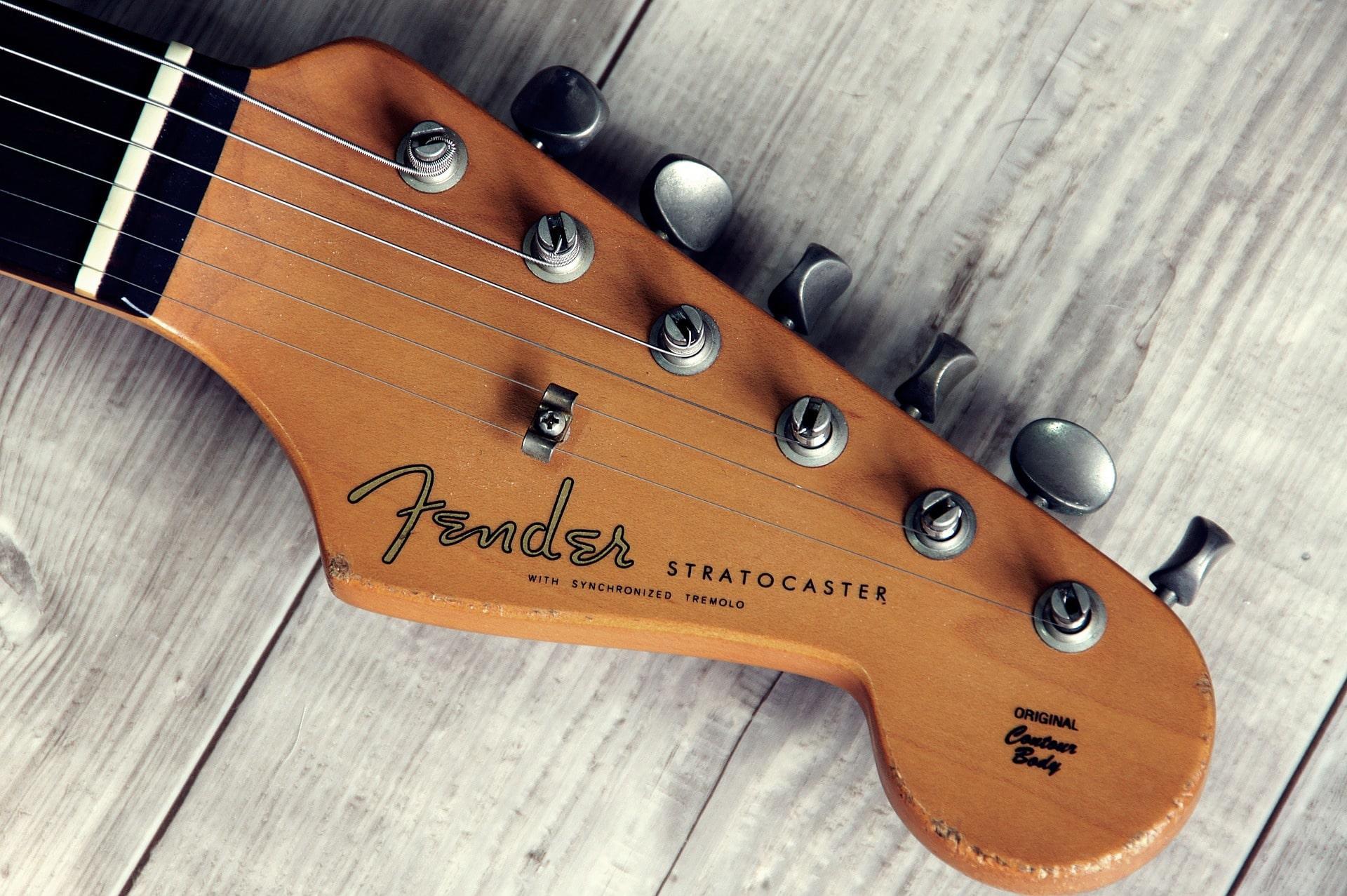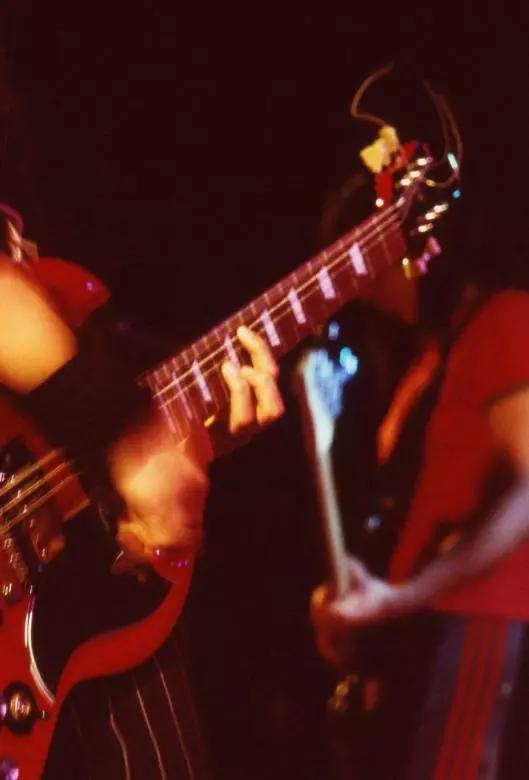"Notes and chords have become my second language, and, more often than not, that vocabulary expresses what I feel when language fails me." Slash.

With that said, music can work wonders for your brain. Music can influence your perception of effort. A study by Southern Connecticut State University showed that basketball players who ran listening to music ran 5 minutes longer than those who didn't (at 85 to 90% of their maximum heart rate ). And did you think that music only relaxed you?
It doesn't matter whether you learn guitar on your own, with a guitar teacher, or on a guitar course. The reasons you want to learn guitar do not matter either. You can be looking for a new hobby, a method to be more creative, a reason to meet new people, or being more attractive, learning guitar is always a good idea! Thus, if listening to music can come with such benefits, playing the guitar can, too. This article will look at some of the benefits of playing the guitar. Let's get started! We are sure you will be surprised!
Find out about effective online guitar lessons here.

Learn the very basics while having fun!
But first, let us do a game to put you at ease with guitar terminology! It doesn't matter if you are a beginner with the guitar. We will give you some clues to help you survive! Find the correct concept with the help of its definition, completing the sentences.
- Arpeggio
- Fourth string open
- A, B, C, D, E, F, G.
- Drums
- Fretboard
- Guitar Chords
- Mexico
- E, A, D, G, B, E.
- Bend
- Singing
- Electro-acoustic guitar
- The blues
- Spain
- Improvisation
- Flamenco
- Classical guitar
- Bridge
- Melomaniac
- Guitar
- Six strings
- Singing
- The _______________ _______________ (two words) is also known as the Spanish guitar. This type of guitar is used to play flamenco, but we can use it for many more styles of music. It has nylon strings that are easier to manage than steel strings. For this reason, it is a great option for young players and the most popular for beginners.
- The _______________ _______________ (two words) is very similar to the acoustic guitar but with it we can amplify the sound by using amplifiers. These types of guitars are very populars for use with recording equipment and sound effect pedals.
- The _______________ (one word) means making up a solo as you go. You will do it once you have enough experience with the guitar.
- An _______________ (one word) is a chord played one note at a time.
- A _______________ (one word) is the wood section of the guitar with frets mounted on it. Normally, It is a thin, long strip of material that is laminated to the front of the neck of an instrument.
- The _______________ (one word) is a section of the guitar located on the body where the strings held. It is on the opposite side from where you tune the guitar.
- A _______________ (one word) is a guitar technique where you push or pull a string enough to change the pitch of a note. If you do this far enough, you can raise the note to another specific pitch.
- A _______________ (one word) is a person with great enthusiasm or very passionated about music.
- With the _______________ (one word), you can play on an acoustic or electric guitar. Playing this style of music takes you back to the roots of early American musical history.
- The guitar was probably originated in _______________ (one word), early in the 16th Century, deriving from the guitarra Latina, a medieval instrument with a waisted body and four strings.
- Antonio Torres Jurado is today credited as one of the most important inventors in _______________ (one word) history.
- The 5 notes on a guitar, listed from low to high, are: _______________.
Now that we have made you hesitate a bit let's go back to relax and learn about all the benefits that learning guitar can bring you. Let's discover them together!
Find out about effective online guitar lessons here.

"Get to know the very guitar basics!" Source: Media Libray.
Play the Guitar to Improve Your Memory!
Whatever style of music you choose, whether you play electric guitar or acoustic guitar, one thing's for sure: you're going to have to learn a lot of new guitar techniques and to learn all these techniques, you need to have a perfect memory!
When you first start learning guitar, these basic techniques might include barre chords, chord progressions, pentatonic scales, arpeggios, and rhythm, among many others, and you will receive too much new information; we can also guarantee that! We are going to give you an example of how you will progress in guitar:
First, you will start to learn the names of guitar parts; then, you will learn how to read the guitar TAB and chord diagrams; after this, you will get to know some basic finger exercises, so you will be able to learn some essential guitar riffs and open chords. And, after all of this, you will learn some strumming patterns. Why was it essential that you know this example? As you can see, with each learning step, your brain will form blocks of information to scale to more complex ones. And this is how human memory works very briefly.
In a little more technical terms, let's get to know the psychic processes that happen in our brain.
Memory has three primary functions: The first is to collect new information, the second is to organize the information to have meaning, and the third is to access it when you remember something. So, the memory of data, facts, or new knowledge consists of three main stages: Encoding, storage, and retrieval.
- Encoding is the transformation of stimuli into a mental representation. In this phase, the attention and intensity with which the stimuli are processed are critical. This means that if you are motivated enough to learn guitar, you will pay more attention, and your brain will be able to encode the new information that you receive more easily. Do you see how important it is to be motivated?
- Storage consists of retaining information in memory for later use. That is, everything you learn your brain stores in a kind of mental drawers, which you can easily access if you need that type of information. For example, when a person is bilingual and is in an environment where there is the possibility of speaking different languages, the brain identifies the mental drawers of "English" and "French." The brain leaves both drawers available if the person needs to switch between the two languages.
The same thing happens with everything new you learn about the guitar!
The storage stage is also in charge of organizing the information. This organization is arranged through schemes or structured units of knowledge that bring together concepts, categories, and relationships, forming knowledge sets. As you can see, the brain is a specialist in organizing information in a super-specific way. Nothing to do with your wardrobe!
- The last stage is retrieval. It refers to how people access the information stored in their memory. In other words, the way the brain looks for what it needs within these mental drawers that are left already available.

Also, when you start learning guitar, all types of memory are engaged:
- Episodic memory involves learning, storing, and retrieving information from personal experiences. These memories include information about an event and the specific time and place it happened. For example, listening to a song reminds you of another memory, person, or a particular time and place. Just like your vacations last summer.
- Semantic memory: This is a type of long-term memory that involves the capacity to remember words, concepts, or even numbers, which is essential for the use and understanding of language, for example. Were you willing to understand the language of the guitar? Here you have the answer!
- Perceptual memory: Long-term memory for visual, auditory, and other perceptual information, including memory for people's faces and voices, the appearance of buildings, and your favorite guitar song!
- Procedural memory: This is also a type of long-term memory involving how to perform different actions and skills. This type of memory helps us remember how to do certain things, such as driving a car, cooking an omelet, reading guitar tablature, and tuning our guitar.
- Working memory: This part of memory provides the necessary information to complete specific tasks. Examples of working memory could include holding a guitar note in mind while listening to the instructions about getting there.
In addition to playing the guitar will promote better memory, it will also help you have better levels of concentration. When you learn to play guitar, you'll also learn to concentrate for longer because there is no other way to learn. Thus, you will develop your concentration skills. Say goodbye to using your cell phone every 5 minutes if you really want to learn to play guitar!
To learn anything, you will need a certain degree of discipline, and you'll soon be able to concentrate for a couple of hours without any problems. It's great for when it comes to playing the guitar but also for your professional life. The more you can concentrate, the more quickly you'll learn, and the more you'll remember.
The brain is an important muscle that we rarely flex. Like any other muscle in our body, it needs regular training to remain effective. And this is beneficial for children and adolescents, of course. Still, it is also super helpful for adults since working on their memory and concentration will improve the ability to analyze, reason, make decisions, reduce the effects of aging and reduce the risk of Alzheimer's.
Due to all the brain processes that occur when learning something new, we reaffirm that playing the guitar is an excellent way to stimulate your brain and memory. Even if you are a beginner on the guitar, you can see the benefits from the moment you start paying attention to your first lesson. So, let's avoid all kinds of distractions!
Did you know that another benefit of playing the guitar is developing better listening skills, hearing the rhythm, and playing to a beat? Learn more here!

Getting Rid of Stress by Playing Guitar!
Stress is more common than you think in the 21st Century. Did you know that nearly 27% of Canadians between 35 to 49 years old are the ones with higher perceived life stress? This is worrying because we are talking about more than 2 million people! Find out more here!
It seems that nowadays nobody is safe. An annoying colleague, traffic on the way to work, a doctor's appointment, there are so many sources of stress in the modern age. It almost seems sadly inevitable.
It would be best to find a way to avoid and manage your stress. It can be detrimental to your mental and physical health. This could lead to mental health problems like depression, anxiety, personality disorders, and cardiovascular diseases, like heart disease, high blood pressure, heart attacks, obesity, and other eating disorders.
Don't you think that having a go at playing a Hendrix riff or playing some flamenco rhythms when you get in from work after a stressful day could be a good idea? If you give it a try, maybe the guitar could be an excellent remedy for you to relax! The guitar could help you take all the mental weights off you. Thus, with less stress, your mood will improve, and so will the quality of your sleep. In short, perhaps playing your favorite musical instrument can contribute to a better quality of life.
"The good stress", or what psychologists call "eustress," is the type of stress we feel when we are excited. Yes! not all stress is bad. You'll probably feel stressed before starting a very challenging job, before traveling to another part of the world for the first time, and perhaps going on a first date. This type of stress will motivate you and encourage you to perform to the best of your abilities. Good stress is temporary and can help you achieve any goal: putting on a good guitar show, in this case. However, it can be exhausting, and you'll need to recover afterward.
Take exceptional guitar lessons to ease your mind! Perhaps by having personalized guitar lessons, you can relax and enjoy learning guitar to the fullest!

Gain Discipline by Learning to Play the Guitar!
Unlike the piano, where pressing the key will produce a pleasant sound, a budding guitarist needs to correctly press down on the fretboard and accurately strike the string to make an excellent sound. Like the violin, there's a tough learning curve at the beginning. You need to persevere and not give up after just two guitar lessons when you can't immediately play what your guitar tutor showed you! However, by working a few minutes on it every day, you'll soon start seeing results.
Your brain needs time to assimilate new concepts, and there are different stages of the learning process that you need to respect. You need to keep your objectives in mind and remain disciplined to get the right results! Sometimes you'll feel like you're stagnating, but you can't give up. The world belongs to the persevering!
Sometimes you need a person who can help you along the way, like a private guitar tutor, who goes at your own pace and respects the progress you are making. So why not find private guitar lessons and get started right away?
Or, if your guitar teacher gives you the green light, you could start playing guitar in a band! What better way to take discipline to a whole new level!

Learning the Guitar for Fun?
Like all musical instruments, you must enjoy yourself when playing the guitar. If you don't enjoy playing the guitar, we don't see any reason to continue doing it. Playing the guitar will contribute to your brain secreting dopamine, the happy hormone. Dopamine is responsible for feeling pleasure, satisfaction, and motivation when you do other enjoyable activities like meditation, exercise, eating something delicious, or shopping.
Feed your happiness by playing guitar! By playing the guitar or your favorite musical instrument, you can also cause the production of dopamine! And why the production of dopamine is essential? Well, having low dopamine levels can make you less motivated and excited about things, and it's linked to some mental illnesses, including depression.
Dopamine and other neurotransmitters of happiness, such as endorphins, act similarly to painkillers and improve the organism's autoimmune response. Therefore, playing the guitar is excellent for your physical and mental health. You can also increase your lung capacity by singing at the same time!
With all these free hormones floating about, you'll boost your self-confidence. The more confidence you have, the more you'll work at it, and the more you'll improve (and the more attractive you will be!) All of these are great reasons to play the guitar! Need we say more?
Expressing Your Emotions with the Guitar
"I write music with an exclamation point!" - Richard Wagner
Music is a great way to express your emotions. The guitar will be your best friend, whether you're sad, angry, or happy.
Besides that, the guitar can help you get rid of your daily stress and enhance your overall life quality; it can also help you express feelings that you can't put into words.
A bit like when writers feel liberated by writing down their painful emotions onto paper, a musician will feel much more at ease having played a few notes to express what they're feeling. Let your fingers freely roam the fretboard, and let your guitar liberate your feelings! It'll do you a world of good.
Composing music is also a great way to express your creativity by writing music describing what you are feeling. Don't hesitate to grab your guitar whether you feel angry, sad, or joyous! Maybe your own life experiences could become Grammy-winning award songs in the future!
Become a Guitarist to Improves Your Social Skills
Music is all about sharing. You share emotions with yourself, an audience, or other musicians. It is a reliable way to establish much deeper connections with others. As a band member or group, you can develop your empathy towards others, improve your communication with them, and even become famous! (It is worth dreaming!)
In a music group, everyone has a role to play, and it's essential that each musician remains humble about their music and not get big-headed. Sharing music with other musicians can help forge strong friendships and is also fun.
However, being in a group isn't always a walk in the park. There will inevitably be tension, and you'll need to learn how to manage disagreements without hurting the other members of your band or splitting the group up. You'll learn to be tolerant of others and respect each musician's work. You'll learn to compromise, just like you have to in relationships. Wow! Who would say that learning guitar could even improvise your management skills!
Whether you're just interested in strumming a few power chords, practicing some strumming patterns, learning how to read guitar tabs, or becoming the next great guitar superstar, with all these great benefits, you should learn how to play guitar as soon as possible!
Find the best guitar lessons and the best private tutor to learn guitar like a master! Have you thought about Superprof? Click here to find the best private guitar tutoring anywhere in Canada!
Get the most out of your inner guitarist with Superprof!

"Success is falling nine times and getting up ten times." Jon Bon Jovi
And there you go! Check the game answers to see how much you know about the guitar!
- Classical guitar
- Electro-acoustic guitar
- Arpeggio
- Improvisation
- Fretboard
- Bridge
- Bend
- Melomaniac
- The blues
- Spain
- Guitar
- E, A, D, G, B, E.
Eso es todo amigos!
Summarize with AI:
















